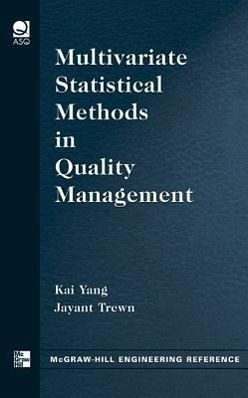Nicht lieferbar

Multivariate Statistical Methods in Quality Management
Versandkostenfrei!
Nicht lieferbar
>Publisher's Note: Products purchased from Third Party sellers are not guaranteed by the publisher for quality, authenticity, or access to any online entitlements included with the product. UPGRADE MANUFACTURING AND SERVICE PERFORMANCE WITH POWERFUL STATISTICAL TOOLS There's no better way to master the most rigorous statistical methods available for analyzing the performance of complex systems -- Multivariate Statistical Methods in Quality Management teaches powerful analytic tools for troubleshooting, root cause analysis, process control, quality improvement, and many other applications. Wri...
>Publisher's Note: Products purchased from Third Party sellers are not guaranteed by the publisher for quality, authenticity, or access to any online entitlements included with the product. UPGRADE MANUFACTURING AND SERVICE PERFORMANCE WITH POWERFUL STATISTICAL TOOLS There's no better way to master the most rigorous statistical methods available for analyzing the performance of complex systems -- Multivariate Statistical Methods in Quality Management teaches powerful analytic tools for troubleshooting, root cause analysis, process control, quality improvement, and many other applications. Written by statistics experts who specialize in reliability and quality engineering, this unique resource introduces the fundamentals and then demonstrates how to: *Choose the best method for each data set * Make complex data intelligible with graphical tools * Coax important hidden information from data with graphical 3-D software and numerical multivariate data stratification * Perform data reduction with principal component analysis, factor analysis, and discriminant analysis * Apply multivariate methods in Six Sigma enterprises * Get clarification from case studies, models, and 50 illustrations * Uncover the source of problems and pinpoint solutions in arenas from manufacturing processes to sales performance and beyond



